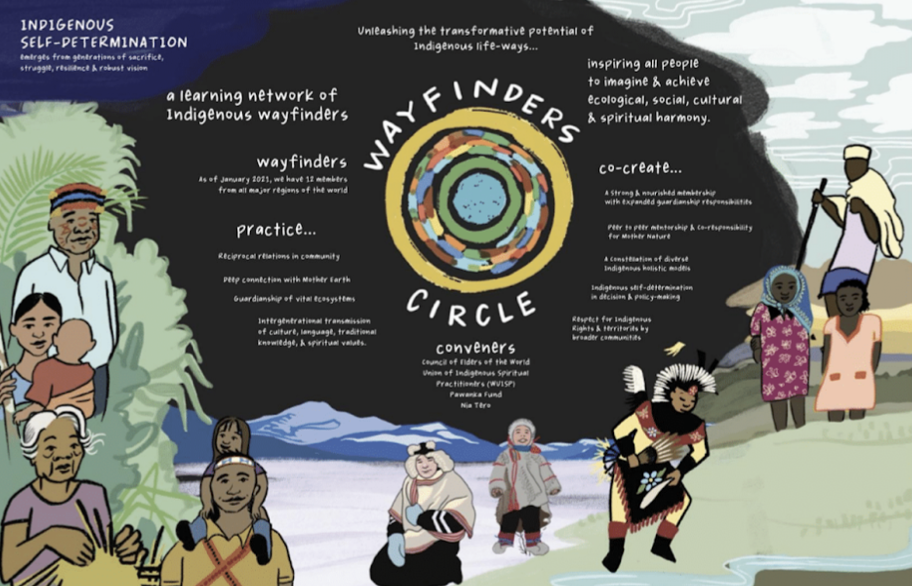Lessons of Indigenous Governance
Indigenous peoples practice numerous governance systems based on their ancestral traditions and incorporating innovations. While these systems vary from community to community, they share many characteristics: a collective sense of responsibility for nurturing, protecting, and defending the territory and the balanced use of their resources and participation in decision-making.
During these times of unprecedented global change, collective governance and the rational use of resources are more critical than ever. Reciprocal community relations, deep connection with Mother Earth and holistic management of traditional territories and water sources are forms of ancestral knowledge that indigenous peoples have passed down from generation to generation. In this context, they still struggle to maintain their identity and self-determination.
In 2019, the Wayfinders Circle was established as a collaborative initiative created by Pawanka Fund and Nia Tero, with the guidance of the Council of Elders of the World Union of Indigenous Spiritual Practitioners (WUISP). It was born from the idea of working together to find a way, with the intention that indigenous peoples can share their wisdom and expand and exchange their knowledge with other indigenous peoples. Thus it implies mutual care and learning.

This network is integrated by 12 indigenous members worldwide, promoting leadership and bringing together indigenous peoples who protect their land, water, and territory and have demonstrated responsibility and commitment to Mother Earth. Wayfinders is a mutual learning network aimed at finding common paths so that different societies achieve ecological, social, cultural, and spiritual harmony.
Wayfinders Circle members have models of territorial governance from which the world can learn to achieve necessary changes and conserve the diversity of life on the planet. However, before delving into governance models, it is essential to reflect on self-determination and its relationship to governance.
For most indigenous peoples, solid governance is based upon the right to self-determination. That is, the essential right to freely determine their type of political organization and to freely find their future and their economic, social, and cultural development. It includes the right to participate fully and effectively in decision-making in all matters affecting their lives, communities, lands, territories, and resources. The right of indigenous peoples to self-determination is recognized in the United Nations Declaration on the Rights of Indigenous Peoples. It implies recognition of indigenous forms of autonomy, self-government, and ancestral authorities.
While Wayfinders inhabit very different areas and have other governance systems, they also have commonalities that we share with you:
1. They have an intrinsic motivation to care for Mother Earth in their ancestral territories and ecosystems. Because of their wisdom and experience, they protect their territories for future generations.
2. They are open to learning, especially concerning governance and custody of their territories, and recognize the importance of sharing given the urgency provoked by the changes taking place on Earth.
3. Their organizations are collectively led. They follow inclusive and equitable decision-making processes and are committed to continually strengthening governance structures.
4. They actively work on the intergenerational transmission of traditional knowledge and practices, culture, languages, and spiritual values. Bilingual intercultural education and traditional medicine are fundamental elements of their governance.
5. They actively participate in networks and alliances with other indigenous peoples and non-indigenous organizations. They apply conflict prevention and resolution measures.
To learn more about these governance models and more information about the Wayfinders Circle, we invite you to read this document here in English or Spanish.
To support Wayfinders Circle members in their efforts to strengthen their governance is to contribute to the custody of more than 37.5 million hectares of land and 72.8 million hectares of ocean, all critical biodiversity hotspots for the planet, and keep indigenous peoples connected.
